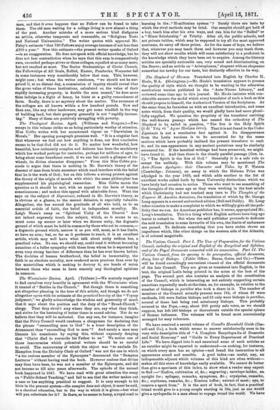The Westminster Review. April. (Trubner.)—We scarcely expected to find ourselves
very heartily in agreement with the Westminster when it treated of "Battles in the Church." Bat though there is something not altogether pleasing in the tone of this article, and though we do not altogether ngree with its estimate of the practical bearing of the " Voysey judgment," we gladly acknowledge the wisdom and generosity of much that it says about the position and the duty of the " Broad-Church " clergy. That they shoal I stay where they are, say what they think, and strive for the hastening of better times is sound advice. Nor do we believe that they will be molested. Can any one, for instance, imagine that the Privy Council would condemn a clergyman for declaring that the phrase "reconciling man to God" is a truer description of the Atonement than "reconciling God to man"? And surely a man may liberate his conscience by saying this, without expressly denying that "Christ died to reconcile his Father to us." We notice one of those inaccuracies which polemical writers should be so careful to avoid. The controversy of which the object was "to exclude Dr. Hampden from the Divinity Chair at Oxford" was not the one in which "a too zealous member of the Episcopate" denounced the "Bampton Lectures " without having read the book. However zealous that divine may then have been, he was not a member of the Episcopate, and did not become so till nine years afterwards. The episode of the unread book happened in 1847. We have read with great attention the essay on "Public-School Teaching," and fail to see that the writer makes out a case or has anything practical to suggest. It is easy enough to hit blots in the present system—the essayist does not object, it must be said, to a classical education, but to the way in which it is given—but what will you substitute for it ? Is there, as he seems to fancy, a royal road to
learning in the. " Hamiltonian system "? Surely there are tests by which the rival methods may be tried. Oar essayist should get hold of a boy, teach him after his own ways, and ran him for the "Balliol" or a "Minor Scholarship at Trinity. After all, the public schools, and not private tuition, which may be supposed to try all the most approved nostrums, do carry off these prizes. As for the mass of boys, we believe that, whatever you may teach them and however you may teach them, they will not show results which will seem satisfactory to a proficient is the knowledge which they have been set to acquire. Among the literary articles are specially noticeable one, very sound and discriminating, on Ste. Beuve ; and an article on " Aristophanes," eloquent with an eloquence somewhat too tawdry for our taste, but distinctly effective in its way.


































 Previous page
Previous page